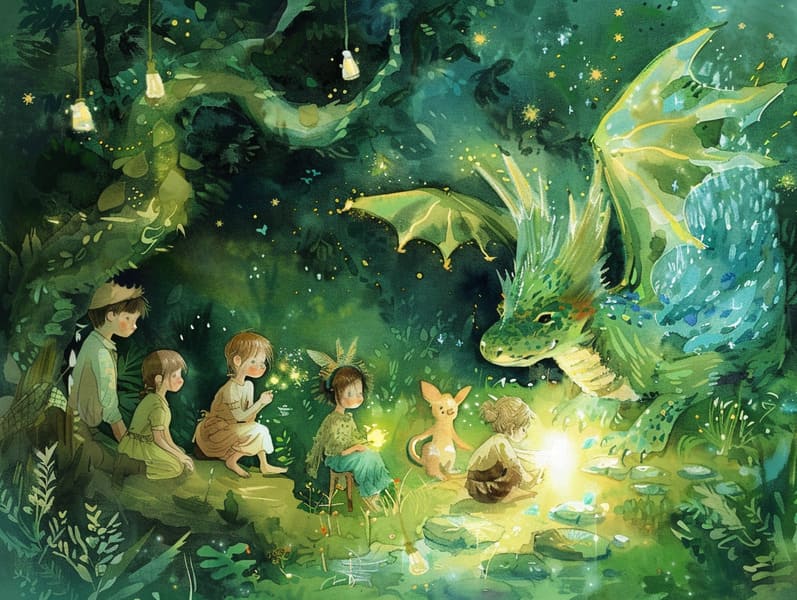Exploring the Beauty of Evening Narratives: Developing Treasured Experiences with Kids
Exploring the Beauty of Evening Narratives: Developing Treasured Experiences with Kids
Blog Article

Nighttime is a cherished time for parents and children. It’s a opportunity to settle down, cuddle up, and enjoy the wonder of stories.
For centuries, children's bedtime stories have been a treasured habit, offering more than just a way to drift off. They provide an means for affection, learning, and igniting creativity.
Significance of Bedtime Stories
Evening stories for little ones serve more than a way to complete the day. They play a key role in a child’s maturation and in enhancing the parent-child link. Here’s why they make a difference:
1. Together Time: Bedtime reading creates a special period of closeness between parents and children. It’s a moment of affection that helps children feel cherished and comforted.
2. Language Acquisition: Experiencing stories helps children develop their communication skills. They grasp new vocabulary, understand syntax, and improve their auditory and understanding abilities.
3. Inventiveness: Kids' stories usher them to enchanted worlds, nurturing fantasy. They envision characters, settings, and adventures, which sparks their imagination.
4. Feeling Recognition: Kids' tales often showcase characters facing difficulties and sentiments. These tales help kids comprehend and navigate their own states, developing emotional growth.
5. Mental Development: Following a story helps children develop concentration, recall, and reasoning skills. They enhance to follow lines of thought, remember aspects, and foresee consequences.
Integrating Stories into Night Routine
Building a nightly ritual that involves sharing tales is simple and beneficial. Here’s how to establish a important part of your end-of-day custom:
1. Select a Comfortable Location: Find a cozy place where you and your child can huddle together without disturbances. A snug bed or a snug reading nook works perfectly.
2. Choose a Specific Time: Determine a designated time each night for bedtime stories. Routine helps children be prepared and makes the habit simpler to continue.
3. Choose Age-Fitting Stories: Pick tales that suit your child’s age. Younger children might prefer books with pictures with easy plots, while older kids may be drawn to books with chapters with more detailed stories.
4. Get Involved with the Story: Make sure the tale be immersive by using different tones and voices, adding sound effects, and encouraging your child to be active. Ask questions about the story to involve them.
5. Set a Relaxing Mood: Adjust the lights, use calm voices, and create a soothing environment to help your child wind down.
How to Find Top Bedtime Stories
There are countless options where you these guys can find excellent bedtime stories for children. Here are some places to try:
1. Books for Kids: Check out your neighborhood library or bookstore to find a wide selection of bedtime stories for kids. Exploring the choices together can be a wonderful activity that also lets children to find stories that capture their interest.
2. Online Resources: There are many places online that offer free bedtime stories. Sites like Storyberries provide a variety of short stories for kids that you can get for free. These choices are great for finding new and varied stories without fees.
3. Audio Books and Story Apps: For nights when you’re too tired to read, think about audiobooks or storytelling apps. These can provide a soft-spoken reading to read your child a story, ensuring they still get their bedtime story fix. Apps often offer fun elements that can keep kids interested further.
4. Personal Stories: Write your own stories inspired by your child’s hobbies. Personalized stories can be extremely engaging and meaningful. You can bring your child in the development process, making them a part of the adventure.
How Short Stories Help
Short bedtime stories are especially effective for bedtime. They provide all the good points of longer stories but are more brief, making them perfect for settling down before sleep. Here’s why short stories are a good choice:
1. Simple to Understand: Compact stories are direct and simple for kids to grasp, even after a long day. They can easily grasp the plot and enjoy the story without becoming distracted.
2. Rapid Interest: Brief tales swiftly engage children, seizing their focus and curiosity. This makes them wonderful for keeping bedtime habits easy yet enjoyable.
3. Various Options: Quick stories make possible for variety in your bedtime books. You can pick a different story each night, keeping the ritual interesting and exciting for your child.
4. Efficient Use of Time: For busy parents, concise narratives are a easy way to verify children still get their nightly dose of storytelling. They fit well into a hectic schedule while still offering the full positives of a bedtime story.
Why "Read Me a Story" Works
The simple phrase, "Read me a story," can bring a world of magic for children. Reacting to this request not only fulfills a child’s request for attention and engagement but also forms lasting occasions. Here’s why it’s magical:
1. Relationship: Storytelling to your child creates a deep emotional link. It’s a time for togetherness, sharing, and bonding.
2. Tradition: Forming a bedtime story routine creates a prized tradition that children wait for every night. It’s a custom that can be continued through generations.
3. Learning and Growing Together: As you narrate, you’ll witness your child’s maturation and growth. Their interest, reactions, and understanding of the stories grow, offering insights into their developing minds.
4. A Safe Haven: Bedtime stories provide a safe space for children to understand emotions, face fears, and find comfort in the familiar presence of a parent.
The Last Word
Children’s bedtime stories are a effective tool for growing a child’s growth and building unforgettable times of bonding.